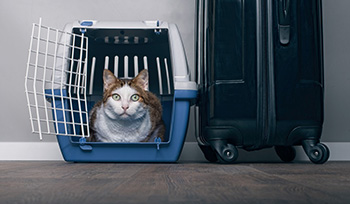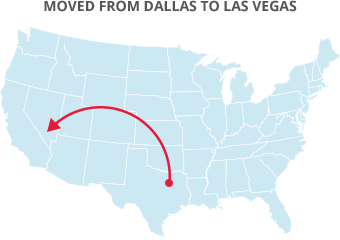 By Julie DeLong, A-1 Freeman Moving Group
By Julie DeLong, A-1 Freeman Moving Group
Moving the family is stressful no matter how you slice and dice it
and keeping the general anxiety at bay for the humans can be quite the
challenge. But while you're making sure your kids are okay with leaving their
schools, friends, and neighborhoods, don't forget that Fido and Leo get
stressed out and need some extra TLC, too. And of course, cats and dogs respond
to environmental changes differently, so you'll need a big head for all the
therapy hats you've got to wear during the move. Animals that live a contained
lifestyle usually lack the emotional attachment you have with your cats and
dogs--fish in a tank just don't tug on your heartstrings like the dog does when
he looks at you at suppertime.
Here's how you can keep your pets relaxed and happy while you
move--so at least somebody in the family isn't a nervous wreck.
Cats
Cats tend to attach to places more than people--tales of cats who
come with the houses aren't necessarily apocryphal. They're a worry if they're
outside cats and you're undertaking a long distance move--cats have been known
to leave the new house to go back "home". This isn't such a worry if
you're going around the block, otherwise, it's a huge concern.
Think about it--your cats don't run to the door to go for a ride
every time you grab your car keys; they're perfectly content to keep sunning
themselves on the windowsill--until you start packing and the windowsill
disappears behind a pile of boxes. Here's how to manage your cats.
- Contain free-range cats, starting several weeks before
you move. Get them used to being inside with you--if this means late-life
litter box training, so be it. Entice them into a pet carrier for a few
hours a day, so that they're not yowling maniacs when you put them in the
car. Take the cats out for short rides when you're running errands--always
in the carrier.
- Moving day, keep the cat and all cat necessities in a
room with the door closed. Once the professional movers have packed the
trucks and you're ready to leave, put Kitty in the carrier. If your cat
does not travel well, your vet may prescribe something, so she doesn't
have a breakdown in the car, thus causing you and the dog and the kids to
have their own mini-meltdowns.
- Once you're installed in the new house, repeat the
moving-out process for a few days. Keep the cats contained in a room with
their stuff, while you deal with the hubbub of moving, unpacking, and
settling in. Even with indoor cats, they'll be happier--and less likely to
demonstrate their unhappiness by ignoring the litter box--if you wait
until you've settled in a bit to let them roam free in the house.
- For outside cats, they'll need some time to adjust to
the new smells of the house and to realize this is where their people are,
before they should be let out to roam. Set some food outside to remind
them where home is.
Dogs
Your dog just wants to be with you, but he'll get anxious when
you're anxious. Canine stress is highest pre-move, so here's how to keep Fido
calm and cool when you're losing your mind.
- Allow plenty of time for packing, if you're packing
yourself. Seeing a little movement daily isn't a big deal; going to puppy
camp for the day and coming home to an empty house will freak him
out.
- Stay in your regular routine--walks, dinner, whatever
you do, keep doing it.
- Update the contact information if he's microchipped;
you can usually go online to make those changes.
- At the new house, show him the yard, take him out for a
walk, and ensure dinner time is consistent.
Fish, Hamsters, Birds
Secure the cages in the back of the car or hire a pet mover to
transport them. As aquariums and fish can be a challenge to move, you could consider
donating the aqua-pets to an elementary school.
Get copies of your pet's veterinary records before you move, so
you have all the immunization records handy if you need to board before you see
the new vet.
Keeping your pets happy while you move goes a long way towards
keeping you happy. Following these tips will ease the stress of relocating the
pets, at least.
Request a free quote


 By Julie DeLong, A-1 Freeman Moving Group
By Julie DeLong, A-1 Freeman Moving Group 
